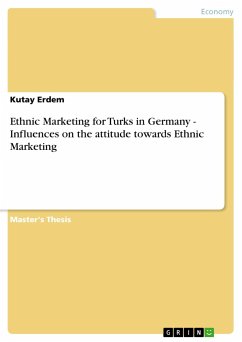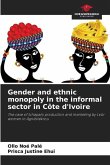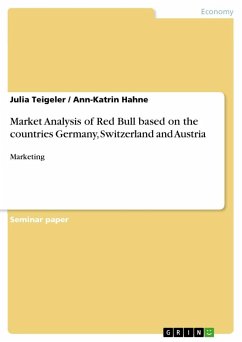Master's Thesis from the year 2006 in the subject Business economics - Offline Marketing and Online Marketing, grade: 1,0, Manchester Metropolitan University Business School, language: English, abstract: This master dissertation analyses the Turkish population in Germany and its attitudetowards ethnic marketing. The Turkish population in Germany has specialcharacteristics which are different from the mainstream German society as e.g. theirlanguage, culture and religion. However, the Turkish population in Germany cannot be characterised as one group. Different generations within this group show different characteristics and habits and therefore need to be evaluated solely. Consequently, it is important to know which generation of the Turks a company wants to appeal to with an ethnic marketing campaign.As ethnic marketing is the ideal way to appeal to those people of an ethnic minoritywho are connected to their culture, language and ethnic identity, the first generationTurks were analysed as being the most ideal target group among the Turks in Germany.The primary research showed that ethnic marketing is seen as rather positive by the firstand second generation. Nonetheless, a closer analysis indicates that because of thedifferent classifications of both generations into acculturation levels, where the secondgeneration shows a higher affinity to acculturation, the first generation has a quite morepositive view of ethnic marketing. A further research emphasises the differences among the Turkish society with the analysis of the ethnic identity of the Turkish population in Germany and the different attitudes towards ethnic marketing, which arise due to differing strengths of ethnic identity.This analysis indicated that the Turks in Germany can be classified as havingmostly a strong ethnic identity. Moreover, the correlation between the strength of ethnicidentity and the attitude towards ethnic marketing can be stated as being positive. Thisemphasises the fact that those people who feel more connected to their ethnic identityhave a much more positive view about ethnic marketing. However,a correlation between the ethnic identity and the acculturation progress is not evident as a strong ethnic identity is viable among all acculturation levels.This phenomenon indicates that regardless the development of the acculturation process it can be stated that the Turks in Germany are a group which has a strong connection to its ethnic identity. Overall, ethnic marketing is a good tool to appeal to the Turkish ethnic minority; however, a well thought-through plan regarding the choice of the desired target group is essential.
Hinweis: Dieser Artikel kann nur an eine deutsche Lieferadresse ausgeliefert werden.
Hinweis: Dieser Artikel kann nur an eine deutsche Lieferadresse ausgeliefert werden.








